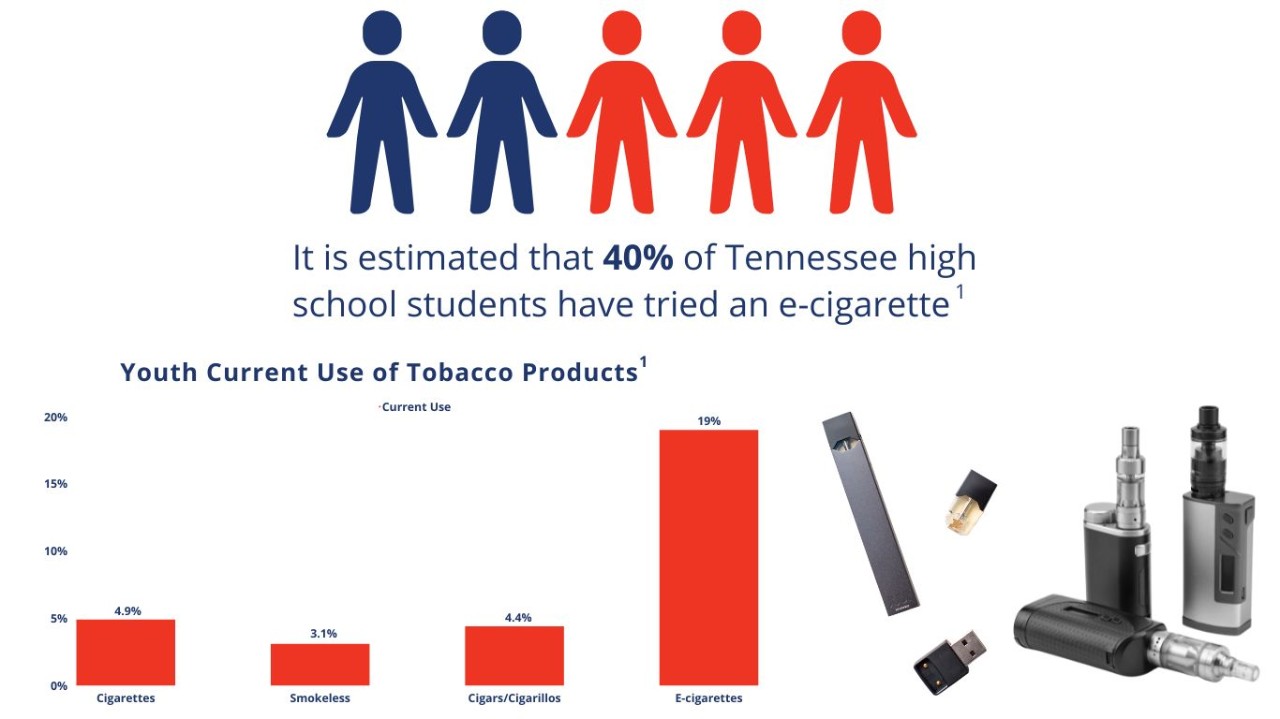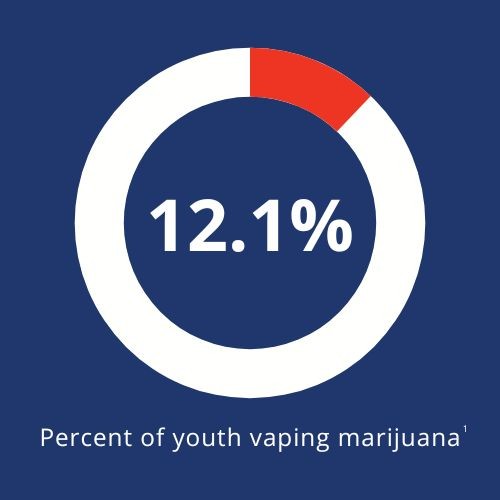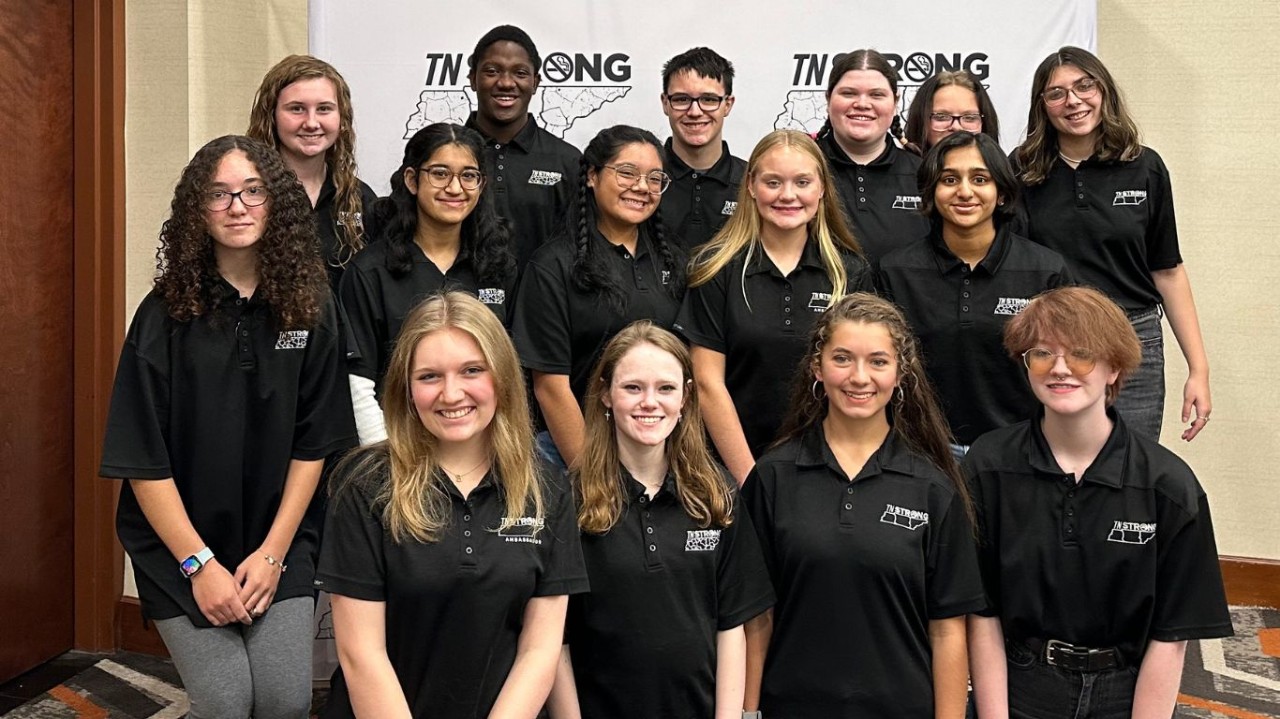Tennessee Tobacco Free Schools Policy Toolkit
Nicotine Free Schools K-12 Policy Toolkit for Educators and Administrators
This Tobacco Free School Toolkit was developed by the Tobacco Use Prevention & Control Program at the Tennessee Department of Health. Within this toolkit, there are ways to address many of the concerns school professionals have around youth vaping and tobacco use on their campuses.
- This K-12 Tobacco Prevention Toolkit Contains
- Tips for enforcing a tobacco-free policy at your school
- Tools to help you educate students about the dangers of tobacco use
- Resources for parents and guardians
- Ways you can help youth quit tobacco products
This toolkit contains the recommendations of the Tennessee Department of Health as part of an initiative to support educators and school administrators with the tobacco prevention programs in their K-12 schools. It is published for informational purposes only and is not intended to take the place of local school district policies or procedures.
E-cigarettes have been the most commonly used tobacco product among U.S. youth for the past seven years1
E-cigarettes can look like traditional cigarettes, but may also resemble pens, USB drives, or other non-tobacco products.2

Companies have used many techniques to market their products to youth, including sleek and high-tech designs that are attractive to young users, and flavors like “blue razz lemonade” and "cotton candy.” In March 2019, the FDA took steps to restrict flavored e-cigarettes, but those regulations did not include popular mint and menthol flavors. These regulations also created a loophole that left many flavored tobacco products on the market.3
Effects of E-cigarettes
Nicotine in E-Cigarettes
Nicotine is a highly addictive substance found in tobacco products. It affects key receptors in the developing brain, making young people more susceptible to nicotine addiction and potentially lead to future addictions.5
Not only does the use of these products increase the risk for addiction, but it can also harm brain development that may impact students’ health and mental health, which puts students at higher risk for lower attendance and academic performance.5
E-cigarette users have double the odds of having a diagnosis of depression compared to those who have never vaped.6
What they're made of
- E-cigarettes have varying amounts of nicotine, toxic chemicals, and heavy metals such as cadmium, lead, nickel, tin and copper.5

The federal and Tennessee state governments made it illegal for a retailer to sell any tobacco to anyone under the age of 21 to help protect youth from these dangerous pitfalls.4
Learn how to communicate with students about the dangers of e-cigarettes here: tn.gov/health/suspension-alternatives
Educating parents about the negative effects of tobacco use can help prevention efforts
Host an Information Session
Partner with your local health department and other organizations to present the facts on tobacco use. The health consequences for youth growth, development, addiction, and how parents can support their children in being tobacco free should be addressed in this session.
Provide resources to parents that give them the knowledge to have meaningful conversations with their children
Parents Against Vaping E-Cigarettes (PAVe) is an organization working to protect kids from the dangers of e-cigarettes and the predatory behavior of Big Tobacco.
More on Parent Resources: tn.gov/health/tnstrong-parent-resources
The policy needs to be displayed visibly and articulated clearly in the student handbook and on the school district’s website, as well as individual school websites.
Visible signage should be at all school-board-owned properties, including at the entrances to the school grounds, on athletic fields and properties, and at entrances to school buildings.
Make announcements at the beginning of public events hosted by the school, such as sporting events, school plays, and back-to-school nights. For events where people come and go, consider making announcements periodically throughout the event as a reminder.
Communication can be done via social media, newsletters, and similar channels
Get printable signage: tn.gov/health/tupcp-resources
Enforcing Tobacco Free Policies
Proper enforcement of your tobacco free policy is critical to its success. Tobacco use is more than a discipline issue; it's an addiction issue.5
Tips for Enforcing Tobacco Free Policies
- Progressive Discipline
o Disciplinary procedures should start with lesser consequences and become more severe with each violation.
o Adolescents can quickly become addicted to nicotine, even if they are not daily tobacco users. Students who violate the tobacco free school policy should always be provided with resources to help them quit using tobacco products.
Keep open lines of communication with parents to ensure understanding. Avoid shaming and instead provide support and resources.
The CDC and Tennessee Department of Health do not recommend the use of vape detectors. These have not been proven to decrease the number of students vaping in schools.
Check out INDEPTH: An Alternative to Teen Nicotine Suspension or Citation here: bit.ly/k12-indepth
TNSTRONG (Tennessee Stop Tobacco and Revolutionize Our New Generation) is a youth-led, statewide movement committed to raising awareness of the dangers of tobacco and fighting against the tobacco industry's influence on Tennessee youth.

TNSTRONG Ambassadors
Ambassadors plan, implement and participate in tobacco education and advocacy events across Tennessee. They engage in local and statewide activism, educate their peers on tobacco-related issues, and inspire others to start taking action. These youth leaders receive specialized in-person and web-based training to advance their knowledge and further their advocacy skills.
For more information about TNSTRONG visit tn.gov/health/tnstrong
School teams and clubs have the opportunity to pledge to be nicotine free

When a team or club pledges it includes all teammates and their advisor
For more information contact your local health department or visit: tn.gov/health/nicotine-free-teams

Tennessee Tobacco QuitLine |1-800-QUIT-NOW | tnquitline.com
Smokefree Teen | Text “Quit” 47848 | Download the quitSTART app | teen.smokefree.com
Truth Initiative | Text “DITCHVAPE” to 88709 | truthiniative.org
Catch my Breath | Evidence-based, peer-led teaching approach empowers students with the knowledge and skills needed to make informed decisions about e-cigarettes and resist social pressures to vape. | bit.ly/k12-catch
Not on Tobacco (N-O-T) | N-O-T is an evidence-based program with an impressive success rate, with approximately 90 percent of teens who participate in the program cutting back or quitting tobacco altogether. | bit.ly/k12-n-o-t
EverFi | A new way to drive social impact. Custom education and workplace solutions for today's key issues. | bit.ly/k12-everfi
Tar Wars | A community-based education program designed to teach kids to live tobacco-free. | bit.ly/k12-tar-wars
Stanford Tobacco Toolkit | A theory-based and evidence-informed educational resource created by educators and researchers aimed at preventing middle and high school students’ use of tobacco and nicotine products. | stan.md/47bEsqT
Michigan Model for Health (MMH)TM | Curriculum that teaches students the knowledge and skills they need to build and maintain healthy behaviors and lifestyles. | bit.ly/k12-mmh
Tobacco Education Resource Library | Access free resources for teachers, students, and parents to learn more about the dangers of vaping nicotine. | bit.ly/k12-terl
All of these are research/evidence-based and the only programs the Tennessee Department of Health recommends using in your prevention strategy.
[School District Name]
Monitoring:
Review: Annually |
Descriptor Term:
Tobacco-Free Schools |
Descriptor Code: 1.803 |
Issued Date: |
Rescinds: |
Issued: |
||
The use of tobacco products, including smokeless tobacco, electronic/battery-operated devices such as vapor products and e-cigarettes, and tobacco-related paraphernalia by any persons including students, district employees, guests, and contractors is prohibited on all school grounds at all times. Use of the aforementioned products shall be expressly prohibited in any public seating areas including, but not limited to, bleachers used for sporting events and public restrooms. The use of tobacco and tobacco-related products, including smokeless tobacco and electronic/battery-operated devices, will be prohibited in all vehicles owned, leased or operated by the district at all times. District employees and students enrolled in the district’s schools will not be permitted to use tobacco or tobacco-related products, including smokeless tobacco and electronic/battery-operated devices, while they are participants in any class or activity in which they represent the school district. The school principal shall be responsible for administering appropriate disciplinary actions for possessing or using tobacco products, including electronic/battery-operated devices, according to a progressive discipline schedule. Disciplinary procedures should start with less punitive consequences and progress with each violation. Each step of the discipline schedule should include referral to cessation resources or programs such as the Tennessee Tobacco QuitLine. The administration will consult with the county health department and other appropriate health organizations to provide students and employees with information and referral to support systems, programs and services to encourage them to abstain from the use of tobacco products. Consequences for employees who violate the tobacco use policy will be in accordance with established personnel policies. Visitors using tobacco products will be asked to refrain while on school property or leave the premises. Law enforcement officers may be contacted to escort the person off the premises or cite the person for trespassing if the person refuses to leave the school property. Forfeiture of any fee charged for admission will be enforced for visitors violating this policy. Signs will be posted throughout the district’s facilities to notify students, employees and all other persons visiting the school that the use of tobacco and tobacco-related products, including smokeless tobacco and electronic/battery-operated devices, is forbidden. The following notice shall be prominently posted (including at each ticket booth) for elementary and secondary school sporting events: This is a tobacco-free campus. The use of tobacco products, including battery-operated devices, is prohibited on school property at all times. This policy shall be in effect whether or not school is in session. v1: 04/27/2022 |
|||
This model policy was developed by the Tennessee Department of Health, Division of Family Health and Wellness. The model policy is provided as guidance for school boards to implement best practices to prevent and reduce youth tobacco and e-cigarette use. Anyone considering using this model policy as a guide should consult with legal counsel before adopting or modifying their policy.
TDH Tobacco Free School Model Policy: tn.gov/health/k12-toolkit
ALA Tobacco Free School Model Policy: bit.ly/k12-ala-model
Public Health Law Center Tobacco Free School Model Policy: bit.ly/phlc-policy
1. Tennessee Department of Education. Youth Risk Behavior Survey. Available at: www.cdc.gov/YRBS.
2. Chau R, Jackler C, Getachew B, et al. JUUL advertising over its first three years on the market. Stanford University School of Medicine. https://www.wbtw.com/wp-content/uploads/sites/22/2019/09/JUUL_Marketing_Stanford.pdf. Published 2019. Accessed April 7, 2022.
3. Tobacco Products and Health Harms: Flavored Tobacco Products. Campaign for Tobacco-Free Kids. https://www.tobaccofreekids.org/fact-sheets/tobaccos-toll-health-harms-and-cost/tobacco-products-and-health-harms-flavored-tobacco-products. Published November 26, 2021. Accessed April 7, 2022.
4. Public Health Law Center. E-Cigarette Regulations - Tennessee. https://www.publichealthlawcenter.org/resources/us-e-cigarette-regulations-50-state-review/tn. Published December 15, 2021. Accessed April 18, 2022.
5. Centers for Disease Control and Prevention. U.S. Department of Health and Human Services, Centers for Disease Control and Prevention, National Center for Chronic Disease Prevention and Health Promotion, Office on Smoking and Health; 2016. https://e-cigarettes.surgeongeneral.gov/documents/2016_SGR_Full_Report_non-508.pdf. Accessed April 7, 2022.
6. Mental health and nicotine resources. Truth Initiative. Accessed July 28, 2023. https://truthinitiative.org/mental-health-and-nicotine-resources.